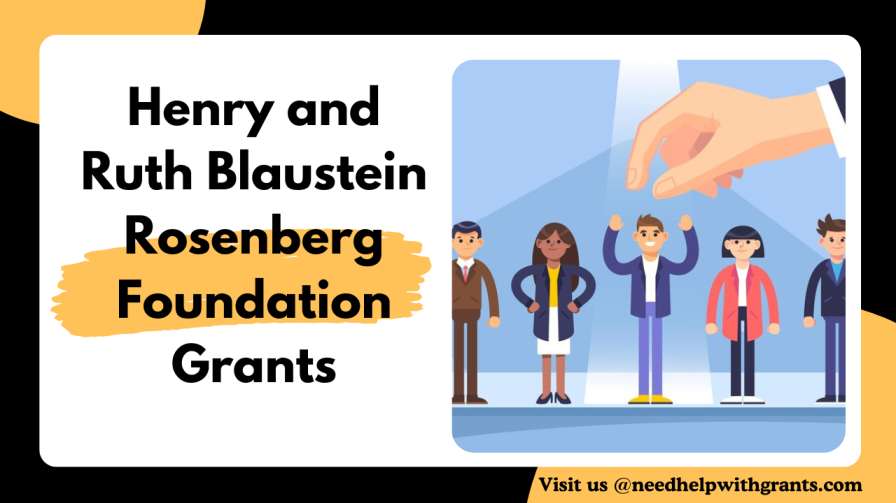How To Get Grants from Rosenberg Foundation Grants – In California, Rosenberg Foundation Grants play a crucial role in advancing social justice and equity. These grants provide financial support to nonprofit organizations and public agencies that focus on civil rights, public safety reform, immigrant rights, and economic empowerment in marginalized communities.
By following guiding principles that emphasize promoting a fairer and more equitable society, these grants help amplify the voices of marginalized groups and support grassroots movements. Through Rosenberg Foundation Grants, forward-thinking leaders can address systemic inequities and implement innovative solutions.
Summary
The Rosenberg Foundation supports social justice initiatives in California.
Grants focus on economic empowerment, immigrant rights, public safety reform, and civil rights.
Only California nonprofits and government agencies qualify for funding.
Applications are reviewed selectively based on alignment with the Foundation’s priorities.
About The Henry and Ruth Blaustein Rosenberg Foundation
Established in 1959, The Henry and Ruth Blaustein Rosenberg Foundation has a rich legacy of promoting lifelong educational opportunities and the vitality of the Baltimore community across many dimensions. The Henry and Ruth Blaustein Rosenberg Foundation is dedicated to enhancing the quality of life in communities. The foundation’s mission revolves around fostering education, promoting health and human services, enriching arts and culture, and supporting environmental conservation. Currently, the Foundation is continuing its grantmaking focus on the Baltimore area, awarding support to nonprofit organizations in two program areas: Youth Development and Environmental Stewardship.
Henry and Ruth Blaustein Rosenberg Foundation Grants Overview
The organization’s history of significant philanthropy and total assets of over $54 million make it an indispensable tool in the fight for social equality and justice. Rosenberg Foundation Grants offered by the Rosenberg Foundation to NGOs in California with a focus on criminal justice reform, reentry programs, immigrant support, voting rights, civil rights, and immigration rights, up to $100,000. Chairs Clara Shin, Benjamin Todd Jealous, Phyllis Cook, and President Timothy Silard are among the most important people in the Rosenberg Foundation. They make sure that the Foundation’s funds are going to organizations that are in line with its objective by guiding its strategic direction and grantmaking efforts.
If you want to know more about the Rosenberg Foundation grants, you can visit the official website of the foundation at:https://rosenbergfound.org/about-us/
Types Of Grants Offered by the Rosenberg Foundation
The Henry and Ruth Blaustein Rosenberg Foundation operates several grant programs, each tailored to address specific needs within its primary focus areas.
Health and Human Services
One of the cornerstone areas for the foundation is health and human services. Grants in this category are aimed at improving access to healthcare, supporting mental health initiatives, and addressing social determinants of health. The foundation recognizes that health is a fundamental aspect of quality of life and seeks to support programs that ensure all individuals have access to the care they need.
Education
Education is another key focus area for the foundation. Grants are awarded to programs that enhance educational opportunities, promote literacy, and support lifelong learning. The foundation believes that education is a powerful tool for personal and community development and works to ensure that everyone has the chance to pursue their educational goals.
Arts and Culture
The foundation also places a strong emphasis on supporting the arts and culture. The Community Arts Project is a shining example of the foundation’s commitment to the arts. With a grant from the foundation, a local arts organization launched a series of community art workshops and public art installations.
Social Services
Social services represent another critical area of focus for the foundation. Grants in this category support programs that provide essential services to vulnerable populations, including food assistance, housing, and job training.
Eligibility Criteria for Rosenberg Foundation grants
The only organizations in California that are qualified to receive funds from The Rosenberg Foundation grant program eligibility criteria are nonprofits and public agencies. Here are the eligibility requirements:
- Nonprofits and governmental agencies with substantial operations in California are eligible to apply, as are groups exempt from federal income tax under Section 501(c)(3).
- All proposed projects must be in strict harmony with the goals and priorities of the Foundation’s grantmaking program.
- According to Section 509(a) of the Internal Revenue Code, nonprofits cannot be considered private foundations.
- People, for-profit groups, and requests for large-scale fundraising activities or endowment drives are not eligible.
- No matter the applicant’s intended field of study, they must show how their work will contribute to the greater good of the Foundation.
- There are many exclusive opportunities for LGBTQ+ communities supported by NoVo Foundation grants. Do not miss to navigate them.
Grants and Assistance Programs Run by Rosenberg Foundation
Grantmaking of Rosenberg Foundation
The Rosenberg Foundation grant program focuses on helping low-income and minority communities in California overcome obstacles. It aims to combat structural disparities and strengthen underrepresented populations for positive social change across the state.
Civil Rights & Civic Engagement
To better the lives of California’s varied population, the Rosenberg Foundation places a premium on civil rights activism. It targets low-income and minority populations in an effort to increase civic involvement, taking into account the fact that the state is minority-majority. Along with other California organizations such as the Women’s Foundation of California and the California Endowment, the foundation helped establish the California Civic Participation Funders Collaborative to increase the impact of these initiatives. The foundation’s mission is to advance civil rights and empower disenfranchised populations statewide by investing in existing civil rights groups, supporting new leaders, and implementing projects to enhance voting accessibility.
Leading Edge Fund
The Leading Edge Fund has supported emerging leaders in California since its inception in 2016. Over three years, each partner will receive an additional $250,000 in training, mentoring, and technical assistance. Goals for the 2022–2024 Partnership Agenda include combating child poverty, ending the incarceration of runaway children of color, developing alternative policing strategies, and providing economic empowerment to states transgender They represent a future leader in the fight for social justice. The fund is a powerful catalyst for change for blacks and communities of color, with support from the Rosenberg Foundation and other organizations such as Heilman, Meadow, Aconadi, California Wellness, Hessing-Simmons, and the California Endowment.
The Foundation’s Justice and Public Safety portfolio
By promoting changes in the criminal justice system, the Foundation’s Justice and Public Safety portfolio seeks to resolve pressing civil rights concerns. Its goal is to reduce recidivism through funding, communication, and direct initiatives that promote sentencing reform, alternatives to incarceration, and reintegration assistance. To reduce incarceration and increase funding for prevention, he co-founded Californians for Safety and Justice in 2013 with organizations including the California Endowment and the Ford Foundation. To support criminal justice reform efforts, he also collaborates with funders for safety and justice in California, including organizations such as the Ford Foundation and the Open Society Foundations.
Immigrant Rights & Workers’ Rights
One immigrant community for every quarter Californian is part of the Rosenberg Foundation’s mission to strengthen immigrant communities. It seeks to include immigrants in economic and civic life by promoting voting rights, immigration reform, and grassroots activism. Building on successes like the California Dream Act, the foundation supports Dreamers’ efforts to influence long-term policy.
The agricultural sector, which employs a large number of foreigners and is worth 43 billion dollars, is an area where the organization fights for the rights of migrant workers. It campaigns for fair wages in sectors such as clothing, restaurants and domestic work, as well as labor safeguards and legalization pathways for unauthorized agricultural workers. The foundation views immigration reform and equitable treatment as moral imperatives for a just society and addresses structural obstacles through strategic investments in labor organizing, litigation, and policy advocacy.
Past Grantees of the Rosenberg Foundation
Examples of projects funded by the Rosenberg Foundation include a wide range of programs that the Rosenberg Foundation has supported in the past, all with the common goal of increasing opportunities for empowerment, justice and equity in California. The Anti-Police-Terror Project’s abolitionist solutions to public safety and the economic empowerment initiatives of Aria Sa’id and Brandon Anderson are two examples of innovative initiatives that are making a difference in their communities.
Aria Sa Id
Along with her co-founder, Aria Sa’id of the San Francisco Transgender District, she received a $250,000 grant from the Leading Edge Scholarship. By creating thriving business centers run by and for transgender people of color, Aria hopes to end the economic discrimination and marginalization faced by transgender people.
The Asian American Federation Inc.
The Rosenberg Foundation donated $10,000 to the Asian American Federation, Inc. Thanks to this grant, the group will be able to continue fighting for the rights of Asian Americans and promoting unity and self-determination among its members.
The California Rural Legal Assistance Foundation
The Rosenberg Foundation provided $40,000 in general funds to the California Rural Legal Assistance Foundation. Thanks to this grant, the group will be able to continue its important work of defending the rights of people living in rural areas and providing them with access to justice.
Brandon Anderson
The Leading Edge Scholarship awarded Raheem Founder and CEO Brandon Anderson a sum of $250,000. The main objective of Brandon’s initiative is to build an alternative dispatch system that meets the requirements of people during serious emergencies without involving the police. This initiative aims to undermine the 911 system and decrease violent police reactions.
Anti-Police-Terror Project
As part of Cat Brooks’ Leading Edge Fellowship, the Anti-Police-Terror Project received a $250,000 grant from the Rosenberg Foundation. Cat Brooks is at the forefront of innovative strategies to improve urban safety in California through the intersection of performing arts, community activism, and visual arts. By rethinking and enacting abolitionist alternatives, this effort hopes to reduce reliance on police responses to community crises and increase the importance of care rather than punishment.
Chaney Turner
Beyond Equity creator Chaney Turner received a $250,000 grant from the Rosenberg Foundation’s Leading Edge Fellowship. To help neighborhoods hardest hit by the war on drugs join the cannabis economy, Chaney is working on an initiative to reform policies and taxes. This effort seeks to empower disadvantaged communities by addressing past injustices and promoting equity and economic mobility through increased investment.
The Central Valley Immigrant Integration Collaborative
The Rosenberg Foundation provided general assistance to the Central Valley Immigrant Integration Collaborative for $30,000. The group can serve immigrant communities in the Central Valley, promote inclusion, and facilitate immigrant integration programs with the help of this funding.
GRACE
The Leading Edge Scholarship awarded Grace GRACE $250,000. By launching the largest baby bonus program in the country, GRACE creator Shimica Gaskins hopes to help economically disadvantaged children and reduce the racial wealth gap in California.
MediaJustice’s Leading Edge Scholarship
For MediaJustice’s Leading Edge Scholarship, the Rosenberg Foundation made a sizeable donation of $250,000. With the support of this fellowship, Malkia Devich Cyril hopes to start a Radical Loss Movement in California, where members of minority groups who have experienced loss can come together to develop transformative grievance practices, fight racist legislation, and promote leadership that recognizes and celebrate the grief of people of color.
She can also open up many possibilities for her organization by navigating through Park Foundation grants, as she is responsible for providing financial assistance to those in need.
How can Organizations Apply for Rosenberg Foundation Grants?
To increase your chance of receiving money from the Rosenberg Foundation, make sure your project is aligned with your priorities by following the application processes detailed below. It makes it easier to apply, makes better use of funds, and fosters powerful collaborations to advance social justice in California.
Understand the opportunity and scope
The Foundation will only consider applications from California government agencies or tax-exempt nonprofit organizations that meet the criteria outlined in IRS Section 501(c)(3).
Information request
Email Lisa Kawahara at lisa@rosenfound.org with a one- to two-page statement outlining the project goals, sponsoring organization, total request amount, project budget, and agency budget.
Complete application
To receive a comprehensive proposal, you must be one of the selected candidates. Foundation employees review proposals yearly before presenting them to the board of directors.
Wait for approval
The Foundation is demanding to ensure that money goes to the right projects. Shortly after submission, applicants receive notification of the decision.
Important note: Applicants need to keep an eye on the deadline for Rosenberg grants. More information about the Rosenberg Foundation grant program guidelines is available on the foundation’s official website at: https://rosenbergfound.org/grantmaking/
Alternatively, applicants can inquire about the grant application deadline by contacting the Foundation’s Authorization of Scholars directly.
Contact Details of The Rosenberg Foundation
Here are a few means of getting in touch directly with the Rosenberg Foundation
Address: 131 Steuart Street 650, San Francisco, CA 94105
Website: https://rosenbergfound.org/grantmaking/
EIN: 941186182
Phone: 415-644-9777
Frequently Asked Questions (FAQs)
What is the Rosenberg Foundation?
The Rosenberg Foundation is a private foundation that provides grants to support initiatives focused on social and economic justice, particularly in California.
What types of projects does the Rosenberg Foundation fund?
The foundation funds projects related to immigration rights, criminal justice reform, economic equity and other social justice issues. The focus is on initiatives that aim to create long-term systemic change rather than direct short-term services.
Does the foundation support organizations outside of California?
The Rosenberg Foundation primarily supports organizations and projects based in California. However, some initiatives with a broader regional or national impact may be considered if they align with the foundation’s priorities.
How can my organization apply for a grant?
Organizations can apply by submitting a letter of inquiry (LOI) through the foundation’s online application portal. If the LOI is approved, the organization will be invited to submit a full proposal.
What should be included in the query letter?
A: The LOI should include a brief description of the organization, the project for which funding is sought, the goals and objectives of the project, the amount of funding requested, and how the project aligns with the foundation’s priorities.
Is there a deadline to submit grant applications?
The foundation accepts letters of intent on an ongoing basis. However, it is important to check the foundation’s website for specific deadlines or updates on the application process.
How long does the review process take?
The letter of intent review process typically takes several weeks. If you are invited to submit a full proposal, additional time will be required for review. In general, the entire process from submitting the letter of intent to the final decision can take several months.
Conclusion
The Rosenberg Foundation grants have led to big changes in California’s approach to public safety, economic empowerment, immigrant rights, and civil rights. The Foundation supports innovative professionals like Aria Sa’id and Brandon Anderson to address unfairness and create new solutions through programs like the Leading Edge fellowship. These investments back grassroots movements and aim for a fairer society, following the Rosenberg Foundation’s principles.
For more grant programs, visit https://needhelpwithgrants.com/



